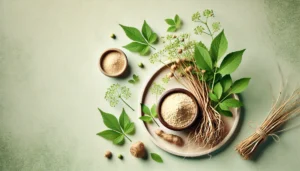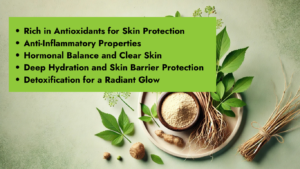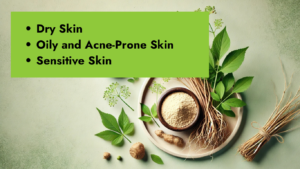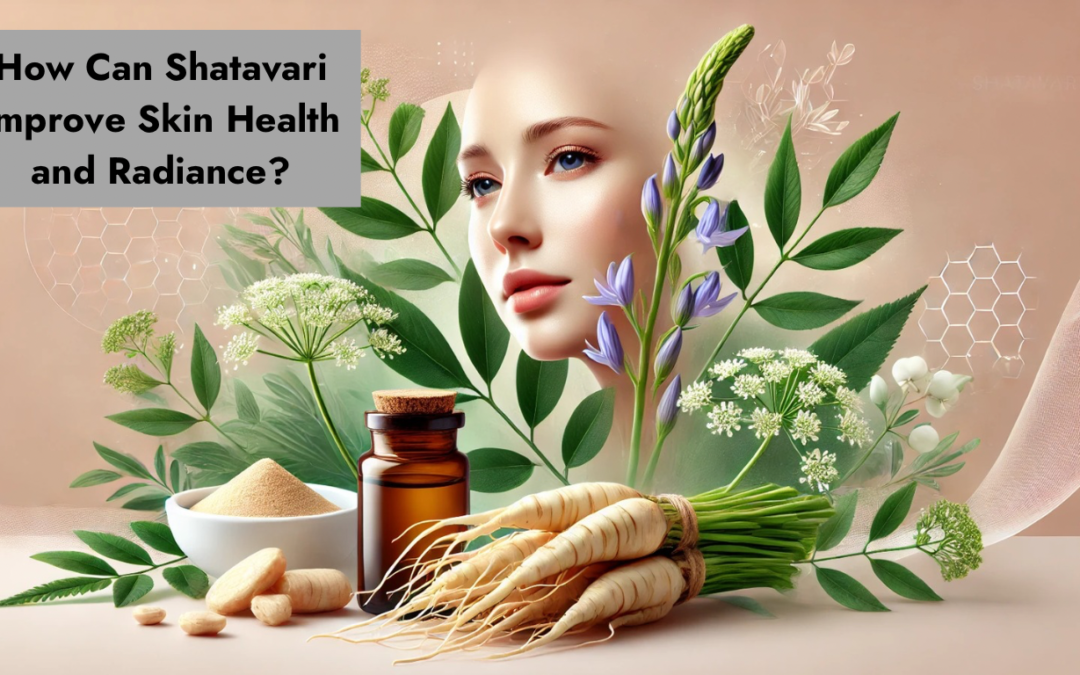In the world of Ayurveda, Shatavari (Asparagus racemosus) has long been revered as the “Queen of Herbs.” Known primarily for its adaptogenic and rejuvenating properties, this herb offers a treasure trove of benefits for overall health, particularly for women.
However, Shatavari’s role in promoting skin health and enhancing radiance remains one of its lesser-discussed yet highly impactful attributes.
In this blog, we will look into the science and tradition behind Shatavari, exploring how it nurtures the skin, combats common skin concerns, and restores a natural glow.

Shatavari, a species of asparagus native to India, is a medicinal herb extensively used in Ayurvedic practices. The name Shatavari translates to “she who possesses a hundred husbands,” signifying its powerful ability to support women’s health, fertility, and vitality. It is rich in bioactive compounds such as:
- Saponins: Natural antioxidants that reduce inflammation and combat oxidative stress.
- Isoflavones: Plant-based compounds with estrogen-like properties, vital for hormonal balance.
- Mucilage: A gel-like substance that retains moisture, essential for skin hydration.
- Alkaloids and Flavonoids: Known for their anti-inflammatory and antioxidant effects.
These compounds work synergistically to not only balance the body internally but also reflect their benefits externally on the skin.
How Shatavari Supports Skin Health

1. Rich in Antioxidants for Skin Protection
Free radicals are unstable molecules that cause oxidative stress, leading to premature skin aging, fine lines, and dullness. Shatavari is packed with saponins and flavonoids, which act as powerful antioxidants. These compounds neutralize free radicals and protect the skin from environmental damage caused by UV rays, pollution, and toxins.
Key Benefit: Reduced signs of aging and prevention of wrinkles and fine lines.
2. Anti-Inflammatory Properties
Skin inflammation can result from acne, eczema, psoriasis, or prolonged sun exposure. Shatavari contains natural anti-inflammatory compounds that soothe irritated skin, reduce redness, and accelerate the healing process of wounds and blemishes.
Key Benefit: Calmer, less irritated skin with reduced breakouts and redness.
3. Hormonal Balance and Clear Skin
Hormonal imbalances are a common culprit behind skin issues such as acne, especially in women. Shatavari’s phytoestrogens mimic estrogen-like activity in the body, helping regulate hormone levels. Balanced hormones mean fewer breakouts, better oil control, and an overall clearer complexion.
Key Benefit: Balanced hormones lead to reduced acne and better skin health.
4. Deep Hydration and Skin Barrier Protection
The mucilage content in Shatavari acts as a natural moisturizer. It traps moisture in the skin, keeping it hydrated and supple. This makes Shatavari especially beneficial for individuals with dry or sensitive skin.
Key Benefit: Improved skin hydration and enhanced skin barrier function.
5. Detoxification for a Radiant Glow
A healthy body reflects healthy skin. Shatavari is known for its detoxifying properties, helping cleanse the blood and eliminate toxins. This internal purification manifests externally, giving the skin a clear, natural glow.
Key Benefit: Brighter, glowing skin free from impurities.
Shatavari for Different Skin Types

1. Dry Skin
- Shatavari’s mucilage provides deep hydration, reducing flakiness and tightness.
- Regular consumption or topical application keeps the skin plump and smooth.
How to Use: Combine Shatavari powder with aloe vera gel and apply it as a hydrating face mask.
2. Oily and Acne-Prone Skin
- Its anti-inflammatory and hormonal-balancing properties help reduce sebum production and acne.
- It minimizes pore-clogging and bacterial infections.
How to Use: Mix Shatavari powder with honey and apply it to your face as a clarifying mask.
3. Sensitive Skin
- Shatavari soothes irritation and calms skin prone to redness or rashes.
- Its natural cooling properties are ideal for delicate skin types.
How to Use: Mix Shatavari powder with yogurt and rose water for a calming face pack.
How to Use Shatavari for Skin Health

1. Internal Consumption
- Shatavari Supplements: Available in powder, capsules, or liquid extract forms.
- Shatavari Tea: Mix 1 teaspoon of Shatavari powder in warm water or milk and consume daily.
- Ayurvedic Tonics: Consult an Ayurvedic practitioner for the right dosage.
Recommended Dosage: 1–2 teaspoons daily or as prescribed by a healthcare provider.
2. Topical Application
- Face Masks: Combine Shatavari powder with natural ingredients like aloe vera, honey, or yogurt.
- Skincare Products: Look for serums or creams containing Shatavari extracts.
- DIY Toner: Mix Shatavari water with rose water for a hydrating facial mist.
3. Diet Inclusion
Incorporate Shatavari powder into smoothies, herbal teas, or milk to make it a seamless part of your wellness routine.
Scientific Backing: What Research Says About Shatavari for Skin Health
Recent studies have validated Shatavari’s skin benefits:
- A study published in the Journal of Ethnopharmacology highlighted Shatavari’s antioxidant properties, which reduce oxidative stress on the skin.
- Research from Pharmacognosy Reviews confirmed that Shatavari’s phytoestrogens help regulate hormonal balance, leading to improved skin health.
- A clinical review emphasized Shatavari’s anti-inflammatory effects, showing promise in treating conditions like eczema and acne.
While research is ongoing, the traditional wisdom backed by these findings underscores Shatavari’s efficacy in skincare.
Who Can Use Shatavari?
- Women experiencing hormonal imbalances, menopause symptoms, or menstrual issues.
- Individuals suffering from chronic dry or inflamed skin.
- Those looking for natural anti-aging and antioxidant-rich skincare solutions.
Caution: Pregnant or breastfeeding women and individuals on medication should consult a healthcare provider before using Shatavari.
Potential Side Effects and Precautions
While Shatavari is generally considered safe, excessive use may cause:
- Allergic reactions (in rare cases).
- Gastrointestinal discomfort if consumed in high doses.
Always start with a small dosage and consult a healthcare professional if unsure.
Final Thoughts
Shatavari is not just another Ayurvedic herb; it’s a holistic wellness solution that addresses both internal and external health. Its antioxidant, anti-inflammatory, and hormone-balancing properties make it a powerful ally for skin health and radiance. Whether consumed internally or applied externally, Shatavari can help you achieve hydrated, clear, and glowing skin.
Incorporate Shatavari into your daily routine and let its ancient wisdom restore your skin’s youthful vibrance—naturally.
Remember: Glowing skin isn’t just about what you apply externally; it’s also about nourishing your body from within. With Shatavari, you get the best of both worlds.

